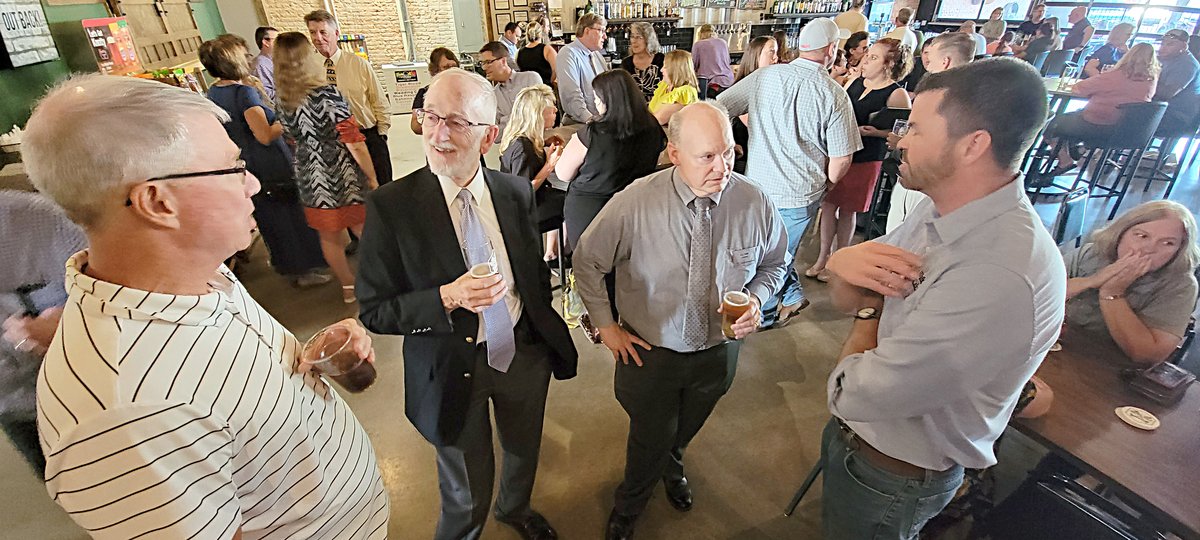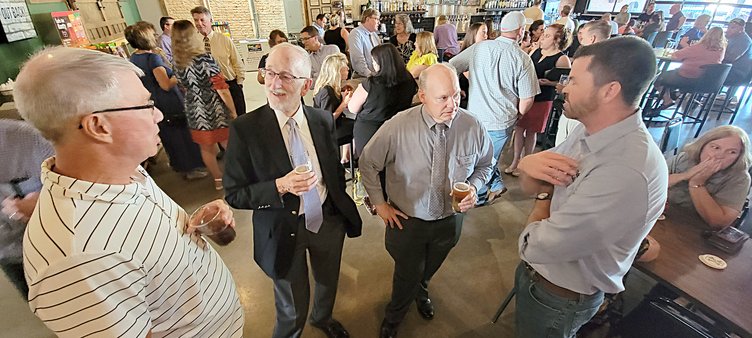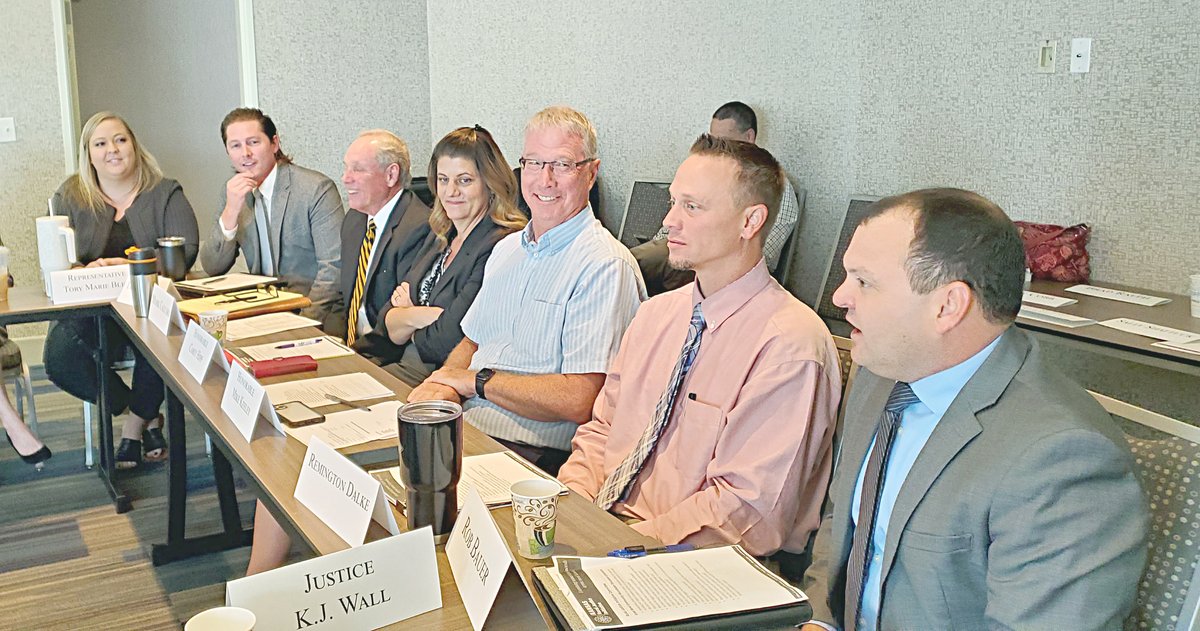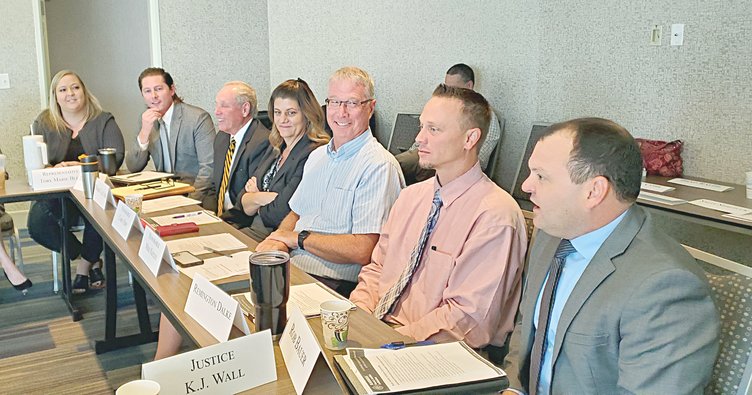The Kansas Rural Justice Initiative Committee visited Great Bend and held a public meet-in-greet Thursday evening at Dry Lake Brewing in advance of the committee’s business meeting Friday at the Holiday Inn Express.
At the community welcome, residents of Great Bend and the surrounding area were invited to meet committee members, learn about the committee’s work, and share their thoughts, said Lisa Taylor, public information director with the Office of Judicial Administration.
“Rural justice. We can’t just sit in Topeka and talk about rural justice,” said Kansas Supreme Court Justice K.J. Wall, who chairs the committee. He and committee members present Thursday night heard stories of counties with a dwindling number of lawyers and a growing need for legal services.
Even though Great Bend is a larger community by western Kansas standards, there is still a shortage of qualified attorneys to cover all the cases.
But, “I think we can make a difference,” Wall said. “I think we can find solutions.”
And, this is not just a problem that impacts the legal profession, but also the medical, engineering and other fields. The committee is looking at other occupations to get ideas.
Wall said the committee visited Great Bend on the invitation of Rep. Tory Mary Blew (R-Great Bend). Blew also serves on the committee.
“We wanted to hear from those who best understand the issue – attorneys and community leaders living and working in rural Kansas,” Wall said. “Their knowledge and experience will help us identify meaningful initiatives to tackle the problem. We thank Rep. Blew and the Great Bend community for their hospitality.”
The committee meeting
The committee’s agenda started with a roundtable discussion, during which legal professionals from across the state discussed how the attorney shortage has impacted their communities. Those on the panel leading the discussion were 20th Judicial District Chief Judge Mike Keeley, retired; district Judge Carey Hipp; Rice County Attorney Remington Dalke; local attorneys Mark Calcara, Taylor Calcara and Rob Bauer; and Blew, the only non-attorney on the panel. Others at the meeting were attorneys, judges and representatives from law schools.
The meeting also included reports from subcommittees tasked with information and data gathering, attorney recruitment and retention, and initiatives and solutions, whether implemented by the judicial branch, the Kansas Legislature or communities.
What brought you here?
Looking at how to recruit more rural attorneys, Wall asked panel members what brought them to central Kansas. Most grew up in Great Bend or a rural community and, for many, their first thought was to seek employment in an urban area.
“I had no intention of coming back to Great Bend,” Mark Calcara said. “But I’m so glad that I did.”
Blew commented on the importance of the Chamber of Commerce, Economic Development and groups such as Barton County Young Professionals. When attempting to recruit young attorneys and other professionals, it is important to sell them the community. Events such as Great Bend Alive’s Final Fridays on Forest are important for many reasons, she said.
“They’ve got to know that this is a great place to practice law,” Calcara said. “We need to catch them after law school and about five years later.” Five to 10 years after law school can be a critical decision-making time when an attorney has found a spouse and is raising a family, he noted.
While rural communities have some common ground, the difficulty in drawing attorneys to an area such as Great Bend is magnified in smaller communities. As an example, there are no trial attorneys in Hodgeman County, it was noted.
Etta Walker, an attorney in Sharon Springs who attended the meeting, said Wallace County has the second-smallest population of all Kansas counties (1,488). Only Greeley County has fewer residents.
Lyons, where Dalke is the county attorney, has a population of 3,611.
“It’s just so isolated,” Dalke said about looking for fellow attorneys for networking within the community. He said rural Kansas attorneys might benefit from a group that could provide mentorship, similar to what the League of Kansas Municipalities offers.
Dodge City attorney David Rebein has proposed such a group under the umbrella of the Kansas Bar Association for rural attorneys. “We recognize that there is a need for an organization that is about us, that speaks for us,” he said.
About the committee
Chief Justice Marla Luckert created the Kansas Rural Justice Initiative Committee in December 2022 to examine un-met legal needs in rural Kansas related to a shrinking number of attorneys living and working in rural areas. The committee has 18 months from its inception at the end of 2022 to submit its initial recommendations to the Supreme Court.
Recommendations could include proposals to change laws, regulations or rules to make attorney services more available. They could also include best practices to make it easier to meet legal needs across Kansas, Wall said.
The 35-member committee includes representatives from all three branches of state government, the legal and business communities, law schools, and various nonprofit organizations.






